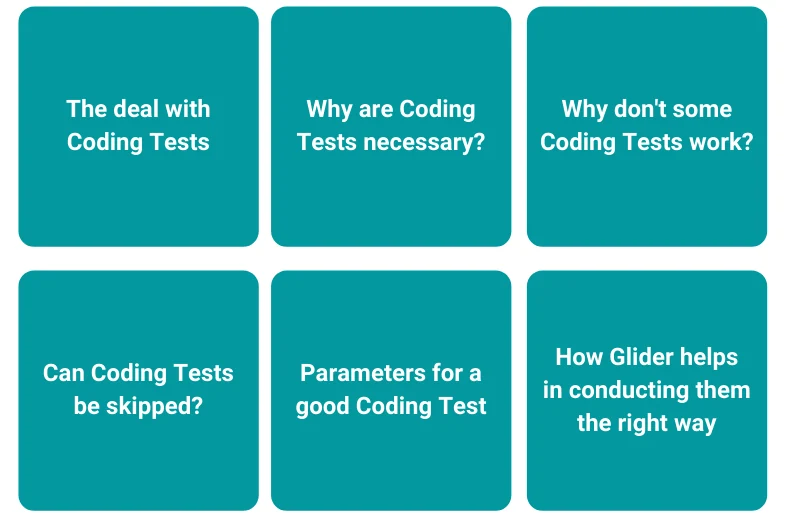Ever wondered why you cannot attract the best talent or retain the talent after what you considered a great coding interview?
The problem may lie in your tactics and you as a recruiter may not be aware of it.
Recruitment is a daunting job and the competition is fierce. The more effective your process is, the better are your chances of attracting and retaining candidates.
For instance, while conducting programming interviews, most recruiters use coding tests to evaluate their candidates’ technical prowess. These are used to weed out the proficient candidates for further interview process while leaving out the rest.
How to know if you have picked up the right candidate?
Well, that is what you will find out in this blog. Keep on reading and uncover the facts about coding tests.

The deal with Coding Tests
With the scarcity of best software talent, it is hard to find the right ones. The need for skills assessment tests has increased significantly. Coding tests serve the purpose of evaluating programmers first hand.
The current recruitment processes are skills-centric and everything that is done during the process is to examine the skill-set. But while evaluating skills, recruiters often overlook the authenticity of such tests and do not realize the null purpose that some of the coding tests fulfill.
Most developers disdain coding tests because they are hardly related to real-work problems. They see coding tests as just part of the process for them to ace the interview.
Why are Coding Tests necessary?
Skills evaluation
The basic advantages of coding interviews lie in evaluating the candidate’s skill-set. These tests help in predicting the candidate’s future job performance and examining the problem-solving skills. These evaluations analyze the effectiveness and efficiency of the candidate regarding programming tasks.
Cost-effectiveness
Online coding tests have helped in saving the extra money that got wasted before its advent. In the present times, organizations conduct coding interviews for candidates from all around the globe in a profitable manner. This development has reduced the earlier hassles related to the recruitment budget, making the process more efficient.
Selection of the best
Online coding tests have made it possible for recruiters to hire the best talent. These tests help to examine the technical prowess of the candidates, making the selection process better. You can eliminate the under-qualified candidates and select the right fit candidates based on the requirements.
Reduction of bias
As these tests are analyzed through A.I, the element of human bias gets nullified. The objective approach makes the process more productive.
While we do use a coding test, we place more emphasis on the actual interview. A person can pass your assessment in the fastest time with 100%, but still not be a good fit for your company. A developer needs to blend in well with the team and have business soft skills, as well as being good at coding.
Why don’t some Coding Tests work?
Most of the times, coding assessments are used to examine the technical understanding of the candidates, rather than evaluating the learning capability of the candidate.
Would you ask your electrician to light a bulb before fixing your electrical problem?
The answer is no, right.
Coding careers are not only about writing memorized, bug-free algorithms on the whiteboard and that too by hand. This activity makes the candidates feel tedious, especially when you could use a laptop and type in the codes.
Though hand-writing codes may seem classy, it is far from being practical or expedient. Besides, whiteboard interviews often involve those questions which are often irrelevant to the actual job.
Less interactive or poorly made tests that do not target the actual requirements provide a bad candidate experience .
Let’s check out some of the reasons why your tests won’t work.
They test the skills rather than the capability of the candidates
Candidates need to practice a lot for the coding tests. For interviewers, it may be a matter of one day but for candidates, it takes weeks for them to mold themselves based on the requirements. This puts a bad impression in their coding career.
Most organizations make tests that are based on some algorithms. While some may be good at those algorithms, others may be bad.
Interviewers need to focus on the learning ability of the candidates rather than on the performance on the algorithmic tests.
Scores indeed have to be significant for companies to make decisions but, even if someone is good at solving algorithms, he may not be a good fit for the role.
Algorithmic ability is not the only skill that defines a good developer. The candidate’s ability to understand and improvise should be the focal point of the tests.
Take too much time
Let’s say you take 3 tests a week, each taking you approximately 60 minutes, and you continued taking those tests for a month. That means you’ve taken 3 full business days of free work from the candidate’s schedule to conduct coding tests.
Most organizations take longer tests that make them strenuous for the candidates. It also makes them under perform at times.
Interviewers should note that the longer the tests, the lower the test-taking rate will be.
As Daniel Alcanja puts it, “It’s very important to watch how [a developer] codes, and how [a developer] is thinking about the problem.”
Conducted at unfamiliar conditions
Most developers prefer their customized settings for performing coding tests. Unfamiliar scenarios make it harder for them to function flawlessly. An organization’s test area may seem uncomfortable for the candidate to perform.
Interviewers should ensure that the candidates are comfortable while giving the tests. Also it’s very crucial to look beyond the coding tests.
These factors are some of the reasons why most developers do not attempt the tests.
Can Coding Tests be skipped?
Simply put, coding tests cannot be skipped. Rather, you should overcome the IT recruitment challenges.
Resume screening can be used as an alternative but you should also keep in mind that developers are not very great at creating resumes. Also, resume screening will only give you a glance at the candidate’s skills and past experiences.
Besides, resume screening may instigate bias in the system resulting in the loss of candidates with great potential.
It’s also true that not all of the candidates would be good at coding. Their resumes may speak something else. According to a report, 78% of job applicants lie during the recruitment process, with 60% declaring a mastery of skill they hardly ever used.
Evaluations are necessary. But they should be relevant and effective.
Parameters for a good Coding Test
Here is a checklist that you should note. If your tests do not meet the following criteria then, some changes have to be made.
Your tests are good only when:
- They are targeted towards a goal and reflect real-work situations.
- The candidates take your tests at a rate of 75% or above.
- They clarify the requirements of the company and determine the concepts that need to be tested.
- They make the candidates believe that they are accomplishing something.
- The average time taken to complete is between 45-60 minutes so that candidates can complete them with ease.
- Candidates give positive feedback after the interviews.
- The employers are happy with the talent pool selected for the further steps.
- Candidates can use the required resources during the tests.
Assessments should be actual exercises related to real work and problems (not actual work though) and should be later in the process when you have both invested time. The biggest problem is many companies give assessments that are NOT focused on real business problems and instead ask serious coders to on the spot right some algorithm function that is generally not used in the real world or to do exercises like Big O. On the flip side they go to simple and pull from a common set of questions that coders can easily study for.
Pieter VanIperenFounder, PWV Consultants
How Glider helps in conducting them the right way
With Glider you can:
- Analyze a candidate’s skill level, personality traits, skills, and cultural fit with the help of holistic interactive assessments, real-world simulations, and general programming.
- Use pre-built tests or create your own with 30+ question types including video assessments. Evaluate the programming skills of candidates with over 40 programming languages.
- Evaluate candidates in all kinds of environments with real-world simulations.
- Code collaboratively with the candidate from a list of pre-built standardized auto-scored coding tasks.
- Conduct tests that are between the time limit of 45-60 minutes.
- Create a talent pool of the best talent for the further steps or drive talent from Glider’s stack ranked talent pool.
- Use auto-evaluated programming tests that do not require any manual intervention.



